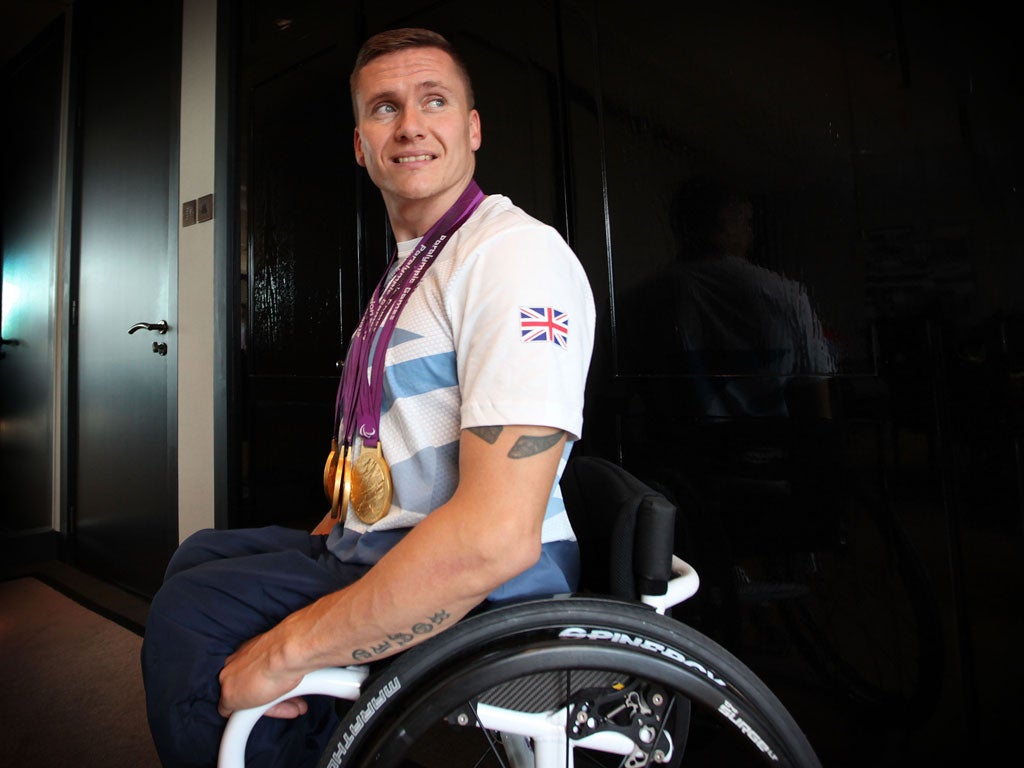David Weir: 'What next? Well I'm off to Ibiza for a party...'
The Paralympian talks to Jerome Taylor about family life, dealing with fame – and why it's likely to be all downhill from here

Your support helps us to tell the story
From reproductive rights to climate change to Big Tech, The Independent is on the ground when the story is developing. Whether it's investigating the financials of Elon Musk's pro-Trump PAC or producing our latest documentary, 'The A Word', which shines a light on the American women fighting for reproductive rights, we know how important it is to parse out the facts from the messaging.
At such a critical moment in US history, we need reporters on the ground. Your donation allows us to keep sending journalists to speak to both sides of the story.
The Independent is trusted by Americans across the entire political spectrum. And unlike many other quality news outlets, we choose not to lock Americans out of our reporting and analysis with paywalls. We believe quality journalism should be available to everyone, paid for by those who can afford it.
Your support makes all the difference.David Weir is used to challenges. As one of Britain's most decorated Paralympians and the most versatile wheelchair racer the world has seen, he is a man who relishes a hard won fight. But with four gold medals to his name from London 2012 – and a total of 10 of various colours since Athens – he faces a new battle. How to face the comedown from the most spectacular summer of his life?
"It will be difficult after this," he admits. "It's easier with previous games but this was the big one for all British athletes. The younger ones, they can really thrive off it and then jump to Rio, but I probably will struggle to get motivated again."
Athletes often struggle to deal with the aftermath of a major tournament, but the idea of Britain's most successful track and field star not representing us in four years' time may surprise some. Yet Weir, who at 33 is expecting his third child, has often been public about his love-hate relationship with his chosen career. He's a man who is undeniably driven, but drive doesn't make the training any easier and he is refreshingly candid about how, at times, what he excels at best often felt like chore.
"I got the love back this year, of the sport," he admits, four glinting medals hanging from a torso that is unmistakably ripped after months of intensive training.
"[Before the Paralympics] I felt like it was slowly coming out of me.
"I kept getting shoulder injuries and was ill. I just had to make sure this was the best preparation and I don't think there will be much that can match it ever."
At the moment, more training is the last thing on Weir's mind – he's not even sure whether he'll go to the world championships in Lyon next year. After all the early starts, the time away from home and the sheer pressure of performing to expectations in front of a home crowd, the next few weeks are all about catching up with loved ones.
"I just want to spend time with my friends and family," he says. "You have to enjoy this moment because it's special and it's not going to last forever."
On Friday, the south Londoner is flying off to Ibiza for a well-earned holiday. "It's with a group of friends," he grins. "It's a party holiday."
But Weir also knows he needs to take what publicity opportunities he can while the summer is still fresh in everyone's memories.
When The Independent met him yesterday morning in central London, he was four hours into a day of meeting the press. It started at a TV studio and he wasn't due to finish interviews with the written press until 4pm.
Given the monumental boost that the Paralympic movement has received from the summer games, he agrees that now is the time to capitalise. "We're on a level par with the Olympians now, which is a first," he says. "Seeing that crowd every day, talking to Olympians in the parade... Ben Ainslie was coming up and calling me an inspiration, Chris Hoy, Bradley Wiggins tweeting me.
"It's a great honour to be recognised as a great athlete, not a disabled athlete. That's what the Games have done." He hopes that the success of London will now encourage spectators and broadcasters to pay more attention to Paralympics sports. "I'd like to see a lot more coverage of the minority sports," he says.
"We have a few races around Europe and we have our nationals. Take the Swiss nationals. The best wheelchair racers go every year because it's organised and there's a fast track. It's like a world championship, the whole world goes there."
With our time running out, there's time for one last question: which one of those four medals on his chest are his favourite?
"Two really," he says. "The 5,000m, because it was my first. And then the marathon. It was difficult for me because I had so many events I couldn't really celebrate. I'd be like 'I've done it!' – I'd then have the medal ceremony the next day, but it would be back to preparing for the next race.
"It was really up and down with the emotions. It was only really on Sunday I could turn around and say wow, I've done something really special."
No one could disagree with that.
Join our commenting forum
Join thought-provoking conversations, follow other Independent readers and see their replies
Comments